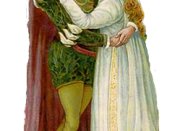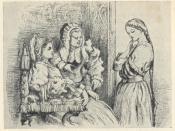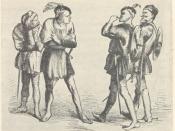In the Prologue to Romeo and Juliet, the Chorus tells us of an "ancient grudge" between two households of equal dignity that has broken out into a "new mutiny" that will cause blood to flow in the streets of Verona and will ultimately result in the deaths of the "star-cross'd lovers." The Chorus points to the heads of these two families as the source of the strife at hand, the rage of their parents causing the deaths of their children. We soon learn the surnames of the warring clans, Capulet and Montague, and both patriarchs (as well as their respective ladies) appear in the flesh in the play's first scene. Although Tybalt of the Capulets is the most aggressive character on the stage, Mercutio's twice-spoken curse, "a plague a' both houses!" (III, i., ll.91, 106), makes it plain that the sides are equally to blame for his death, and by extension, for the tragedy that befalls the lovers.
Beyond this, however, we are never told what the original cause of the war between the Capulets and Montagues was. The inference here is that the conflict is an archaic rivalry based upon the very equality of the families' social standing that has been driven forward by a long skein of injuries and slights. Not only has the issue at odds been lost to time and the overlay of fresh events, there is no effective mechanism to resolve it at hand. While the parental figures of the play, most notably Old Capulet, act as tyrants, civil authority is wanting in Verona. That being so, the cause of the ongoing mutiny that is played out before us does not stem solely from strong parental domination but also from the weak authority of the state as embodied in Prince Escalus.
The play...


